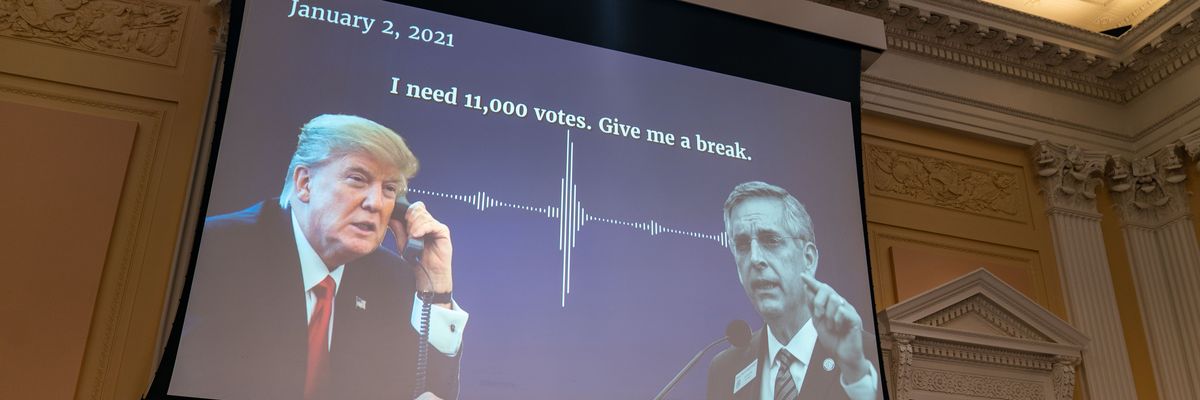On January 2, 2021, mere days before his supporters stormed the U.S. Capitol to stop a peaceful transfer of power, former U.S. President Donald Trump made an extraordinary call to former Georgia Secretary of State Brad Raffensperger. “I just want to find 11,780 votes,” said Trump. “So tell me Brad, what are we going to do?”
The call was one of Trump’s many attempts to pressure state officials, the Department of Justice, and even then-Vice President Mike Pence to overturn the 2020 election, and was among the thousands of pieces of evidence that the Jan. 6 Select Committee assessed before voting to recommend that the Justice Department pursue criminal charges against Trump and others for their part in the conspiracy. However, the DOJ is just one of the forums in which Trump has been facing a reckoning, and in Georgia, Trump may finally face the first indictment for his unconstitutional quest to stay in power. If these indictments are issued as anticipated, it will be a huge step towards legal accountability and will begin to set a precedent so that a power grab like this can never happen again.
Election subversion isn’t simply a partisan act. It’s a criminal one.
The Georgia investigation led by Fulton County District Attorney Fani Willis has reportedly focused on Trump and more than a dozen others, and involved testimony from witnesses including Secretary Raffensperger, Trump’s personal lawyer Rudy Giuliani, former national security advisor Michael Flynn, Senator Lindsey Graham, former White House aide Cassidy Hutchinson, and former Trump Chief of Staff Mark Meadows.
As the recently released partial grand jury report revealed, one or more witnesses in the investigation may have lied under oath, and could face perjury charges. Meanwhile, CREW has published an informative list of possible other charges that the special purpose grand jury might recommend in Georgia. Election-related charges could include solicitation to commit election fraud for pressure placed on election officials and a scheme to orchestrate fake electors. Non-election related charges could be brought for making false statements (pertaining to his repeated claims to officials that he won the election), and criminal solicitation to engage in the scheme.
We shouldn’t have to rely on the integrity of officials like Secretary Raffensperger to maintain the sanctity of our elections, we should deter this type of criminal behavior before it gets to this point.
Additionally, fake electors signed documents that could lead to charges of false swearing and forgery in the first degree. Then there are RICO charges. Trump could face charges in violation of the Georgia Racketeer Influenced and Corrupt Organizations (RICO) Act based upon his repeated false statements, calls to election officials, and alleged coordinated attempts to provide fraudulent electoral certificates.
Had Georgia election officials caved to the immense pressure they faced from Trump, thousands of people would have had their votes stolen. But we shouldn’t have to rely on the integrity of officials like Secretary Raffensperger to maintain the sanctity of our elections, we should deter this type of criminal behavior before it gets to this point. That’s where the courts come in: crimes must be prosecuted and criminals (even former Presidents) must be held accountable.
The January 6 committee illustrated Donald Trump’s efforts to overturn the election in stark detail, and Georgia wasn’t the only state where he and his team focused their pressure campaign. In Michigan, Pennsylvania, and Arizona, Trump unleashed his supporters on state officials, spending millions on ads and posting their contact information to social media. One Facebook post directed his followers to contact Michigan’s majority senate leader Mike Shirkey to “demand a vote on decertification.” Pennsylvania House Speaker Ryan Cutler received daily voicemails from Trump lawyers Rudy Guiliani and Jenna Ellis, and Steve Bannon announced a protest at his home on Dec. 30. At least three protests took place at Cutler’s office or home in the weeks following the election. In Arizona, Trump and Guiliana pressured House Speaker Rusty Bowers to decertify the election there, even pushing Bowers to call a special session of the state legislature to aid their efforts.
The State of Georgia, the Department of Justice, and other states can set vital legal precedent so that going forward no single powerful person can attempt to steal and nullify Americans’ votes.
The threat from Trump and his allies continues, and he is still spreading lies about the 2020 election.
These legal actions are necessary because January 6 was just the beginning of an attack on our democratic freedoms. The threat from Trump and his allies continues, and he is still spreading lies about the 2020 election.
Now, House Republicans are poised to hold a sham investigation into the work of the Jan. 6 committee to detract from their own eagerness to stand with Trump instead of the Constitution. They’ll attack the work of accountability to hide their own role in subverting our freedom to vote.
The potential upcoming charges in Georgia should alarm Trump and his backers in Congress and in leadership roles nationwide. Election subversion isn’t simply a partisan act. It’s a criminal one, which should, and likely will, be met with commensurate legal consequences.
